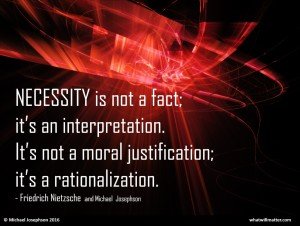Consider these justifications: “The only way I could get the job is if I fudge on my resume” “Everyone has to lie or cheat sometimes to be successful.” “I had to cheat or I would not have passed and if I didn’t pass I would not get into Harvard.” “The other guys were taking steroids, I had to do thesame to compete.” “I had to lie to get the sale.”
A common effort to justify or excuse ethically questionable or even clearly wrong conduct is necessity – “I had no choice.”
There are four things wrong with this:
1) In most cases, there is no factual necessity because the objective could have been achieved by alternative means (you just didn’t think hard enough);
2) You can’t know that you could not achieve your goal without moral compromise you simply assume you can’t to justify cutting corners;
3) Your objective is not truly necessary to your life; it’s merely desirable; and
4) There is no moral imperative that you are entitled to get what you want – the job, personal success, admission to Harvard, winning the race.
Even if both the means and the ends fit some definition of “necessary”, necessity is not a moral justification for unethical conduct, it is just another form of “the ends justify the means” reasoning.

